What is organic food and what does organic mean? All your organic food questions answered…
All your organic food questions answered...
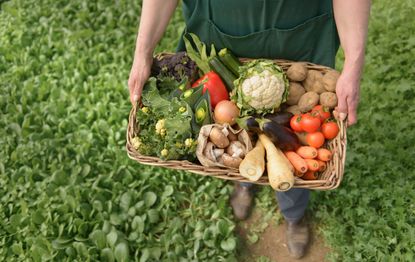

Do you buy organic food because you think it's a good thing to do, but don't really understand the ins-and-outs? Or, or maybe you're on the fence about whether to switch? We've looked into what organic food means and if you should change your shopping habits.
But what is organic food? It remains a popular buzzword but do you really know what organic food is, and what 'organic' means exactly?
If not, you’re not alone and if you want to find out what is organic food, which organic foods are worth buying and how much you should expect to pay, you’ve come to the right place.
What is organic food and what does organic mean?
What is organic food? Organic food is produced on farms which avoid the use of man-made fertilisers and pesticides. The Soil Association is a charity that also owns a subsidiary company, which is the UK’s largest organic certification body.
The Soil Association define organic as a means of producing items that works with nature.
They explain: ‘It means higher levels of animal welfare, lower levels of pesticides, no manufactured herbicides or artificial fertilisers and more environmentally sustainable management of the land and natural environment, which means more wildlife.’
But, even organic food isn't always 100 per cent free of medicine and pesticides. Contrary to popular belief, if and when it is required, fertilisers, pesticide and medicine will be used in order to prevent the produce from going to waste.
GoodtoKnow Newsletter
Parenting advice, hot topics, best buys and family finance tips delivered straight to your inbox.
What organic farming does do though is stop the routine use of antibiotics, which causes antibiotic resistance and is trickled down and consumed by us in the food chain.
While there are nearly 300 pesticides that can be used on conventional farms, there are only 20 that are approved for use on organic farms and they are derived from natural ingredients only.
Even after washing and cooking non-organic foods you are still exposed to the risk of consuming some of these pesticides. Last year a government study found pesticide residues in 47 per cent of British food.
The benefits of organic food
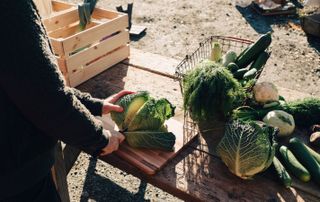
Well, what is organic food's main advantage? It can be traced from farm to fork so you can be confident about what you’re eating.
As well as providing a better quality of life for the livestock reared on organic farms, organic farming is better for other forms of wildlife and for the environment.
The Soil Association estimate that organic farms have 50 per cent more wildlife like bees, birds and butterflies on them compared to non-organic farms.
Organic foods have no artificial colours or preservatives added to them and are often nutritionally different to non-organic foods.
A study conduced by researchers at Newcastle University in 2016 found ‘clear differences between organic and conventional milk and meat’.
Organic milk and meat were found to have roughly 50 per cent more omega-3 fatty acids than their non-organic equivalents and yet you didn’t have to consume more calories or saturated fats.
Organically produced cereals, fruits and vegetables are also thought to contain up to 68 per cent more antioxidants compared to conventionally farmed produce.
In a nutshell the Soil Association explain that organic foods are always free range, have fewer pesticides, have no artificial colours and preservatives, do not have routinely used antibiotics and contain no genetically modified ingredients.
How can you tell if a product is organic?
A spokesperson from the Soil Association explained: 'Organic food must be certified under EU law, and it’s inspected at every step of the process – from field to fork – to make sure the highest standards are maintained. Soil Association certifies about 70 per cent of organic in the UK and many Soil Association organic standards are actually higher than EU standards. That means when you see the Soil Association certified organic symbol on the packaging you know it is a symbol you can trust.'
Organic food: the dirty dozen
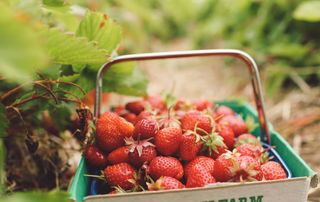
Each year the Environment Working Group, a non-profit non-partisan organisation, puts together a list for consumers to cross reference and change their buying habits accordingly.
The 'dirty dozen' foods are ones that you should always aim to buy organic, as they are the ones most likely to be contaminated with pesticide residues.
This list is based on data from the US Department of Agriculture so it’s worth noting that American regulations and approved pesticides differ hugely to the UK.
Nonetheless, it’s still interesting to see which foods are affected as they are likely to be the most contaminated in the UK too.
Strawberries Spinach Nectarines Apples Grapes Peaches Cherries Pears Tomatoes Celery Potatoes Peppers
Organic food: the clean 15
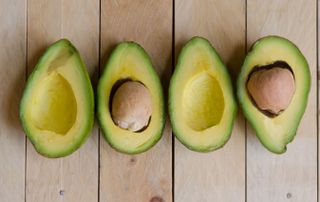
Unlike the dirty dozen, clean 15 foods are deemed as being at a lower risk of having pesticide residues and therefore forking out on organic equivalents isn't as important from a health perspective.
Avocados Sweetcorn Pineapples Cabbage Onions Frozen Peas Papayas Asparagus Mangos Aubergines Honeydew melon Kiwi Cantaloupe melon Cauliflower Broccoli
How to save money on organic foods:
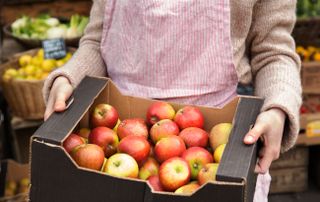
Many people believe organic foods and products cost more but this isn’t always the case. Many organic items are the same price if not less than non-organic products and several retailers have their own organic ranges on sale.
A Soil Association spokesperson suggested stocking up on staples like pulses, pasta, rice and wholegrains.
Buying organic produce directly from farmers markets and shops or through a special delivery scheme is often the cheapest way to buy it. If this isn’t possible consider transitioning to organic food in stages.
Prioritise buying the dirty dozen organically and gradually introduce more products when it's possible to do so direct from the source or when you have more money to spend.
Eating with the seasons is a good way to buy organic fruit and vegetables cheaper as they'll often been in surplus and at a discount when they're in season. Check out our seasonal calendar to see what foods are in season and when.
Planning your meals and eating less meat will also save you money and will often reduce your food waste.
The Soil Association stress: 'When organic does cost more, you’re paying for the extra care organic farmers place on the environment and animal welfare.'
What are your thoughts on organic food? Have you always bought organic food and swear-by it or are you still not convinced? Head over to our Facebook page to get involved with the conversation!

Jessica is a freelance food writer, stylist and recipe tester. She previously worked as Senior Food Writer at Future. While at Future Jessica wrote food and drink-related news stories and features, curated product pages, reviewed equipment, and developed recipes that she then styled on food shoots. She is an enthusiastic, self-taught cook who adores eating out and sharing great food and drink with friends and family. She has completed the Level 1 Associate course at the Academy of Cheese and is continually building on her knowledge of beers, wines, and spirits.
-
 Taken time out of work to raise your children? This new online service could help you maximise your state pension pot
Taken time out of work to raise your children? This new online service could help you maximise your state pension potParents who have taken time out work to raise their family will find it easier to fill in any National Insurance gaps thanks to this new digital service
By Sarah Handley Published
-
 Princess Charlotte will be grateful Kate Middleton made this unique change to her wedding vows - and she was only the second royal ever to ditch tradition
Princess Charlotte will be grateful Kate Middleton made this unique change to her wedding vows - and she was only the second royal ever to ditch traditionThe Prince and Princess of Wales just celebrated their 13th wedding anniversary
By Charlie Elizabeth Culverhouse Published